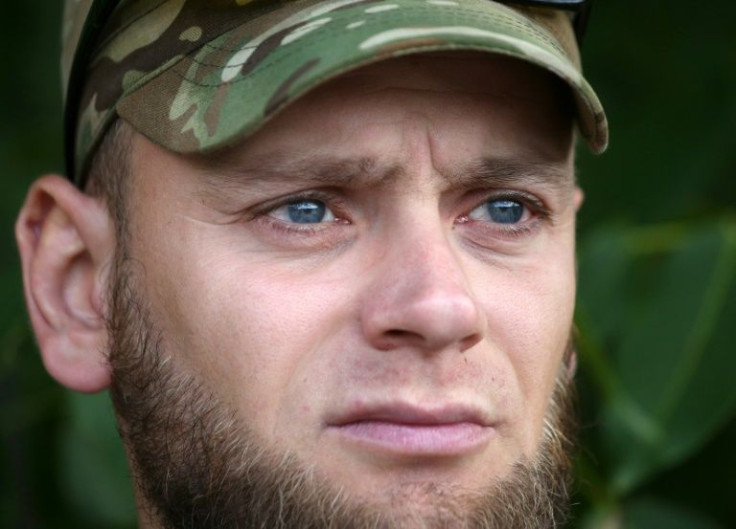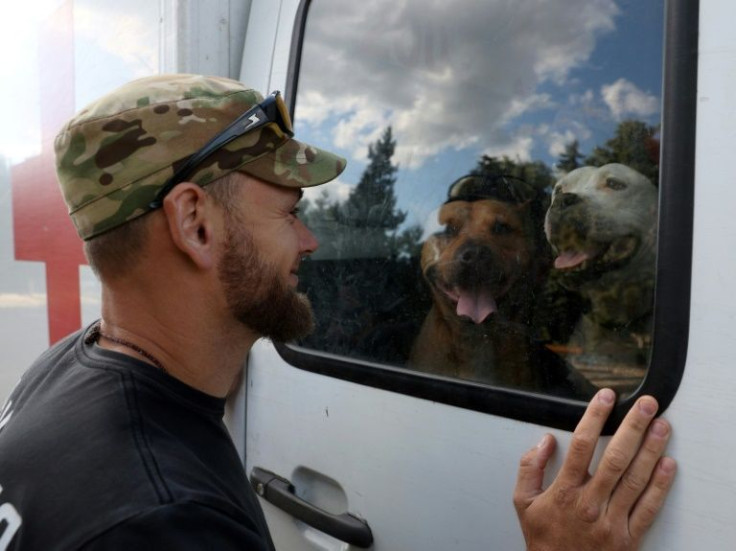In Eastern Ukraine, Volunteers Recover Bodies Of War Dead
Returning to his refrigerated white truck with a red cross on its side, Oleksiy Yukov ends another tough day of collecting bodies from the frontline in eastern Ukraine.
Parked in the city of Sloviansk, the vehicle displays the number 200 next to the symbol -- a reference to a military code used during Soviet times for the repatriation of soldiers' remains.
"I have a duty to get these bodies. After all, the soldiers die for us," said 36-year-old Yukov, who is wearing a T-shirt with a black tulip, an emblem of the eponymous organisation he works for.
The Black Tulip NGO was founded in the early 2010s to find and recover the remains of soldiers killed during the two world wars.

But now the group is searching for victims of a contemporary war that started with a 2014 pro-Russian insurgency in Ukraine's east and engulfed the whole country after Moscow invaded on February 24.
Every day, Yukov and two other volunteers cross the eastern region of Donbas, scouring fields, roads and areas near the frontline for bodies of soldiers and civilians who have fallen victim to the war.
Ukraine's President Volodymyr Zelensky said in early June that between 60 and 100 soldiers were dying daily on Ukraine's eastern front, the scene of the heaviest fighting.
Yukov estimated that he had transported at least 300 dead since the start of the war, most of them handed over to morgues in Dnipro, a city in central Ukraine.

Among them were the remains of Russian soldiers.
"Death doesn't make any difference. All bodies should be treated with respect," Yukov told AFP.
The bodies of enemy soldiers are handed over to the Ukrainian army, which is in charge of arranging exchanges with Russian forces.
In 2014, Black Tulip volunteers would sometimes get permission to recover the remains of soldiers from separatist-controlled territories in Ukraine's east, even if their safety was far from guaranteed.

But now, they said, the red cross on their truck has made it a target for Russian forces which have taken control of large swathes of Donbas territory.
"In 2014 it was hard. But it's nothing compared to what is happening today. It has become a merciless war, a crazy war. No one controls anything anymore," said Yukov, suddenly burying his face in his hands.
"I have images that come to me," he whispered, referring to visions of mutilated bodies and dogs devouring the corpses that haunt him after work.
He will also forever remember the tragedy at Kramatorsk train station in April, where a Russian missile strike killed over 50 people who were fleeing to safety.
Black Tulip volunteers worked for two days collecting body parts, Yukov said.
"Black Tulip is carrying out a very important mission, which very few could do, mentally or physically," said Dmytro Kravchenko, a Sloviansk town hall official.
"In addition to the bodies, the volunteers also collect evidence of the presence of foreign troops. This is important for history," he added.
Black Tulip depends on donations, including sizeable ones made by a Ukrainian church in the United States.
For Yukov, searching for missing soldiers was an interest from an early age.
"When was 11 years old, we went for a walk in the forest with my brother and we came across a mass grave which I later found out was from World War II," he said.
Yukov, a former president of the region's Thai boxing federation, does not report to the army or Ukraine's authorities.
He is deeply invested in the mission. He works tirelessly and has not seen his wife and daughter, who are sheltering in Dnipro, for over a month.
© Copyright AFP {{Year}}. All rights reserved.





















